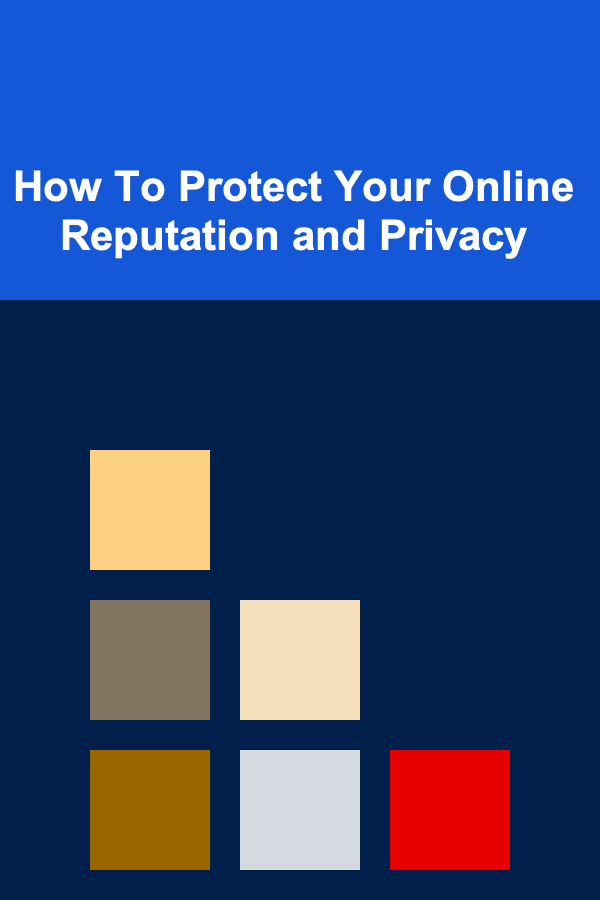
How To Protect Your Online Reputation and Privacy
ebook include PDF & Audio bundle (Micro Guide)
$12.99$6.99
Limited Time Offer! Order within the next:

In today's digital age, maintaining a good online reputation and safeguarding your privacy have become essential. Social media platforms, online forums, and even search engines store vast amounts of personal information, making it increasingly important to take control of your online presence. This article explores in-depth strategies to protect your online reputation and privacy, covering everything from managing your personal information to handling negative content.
Understand the Importance of Your Online Reputation
Your online reputation is the reflection of how others perceive you based on the content associated with your name on the internet. It can be shaped by your social media profiles, blog posts, reviews, comments, and even your interactions with other people online. Just like your personal reputation in the real world, your online reputation is vital for your professional career, personal life, and even your mental well-being.
Why is Online Reputation Important?
- Professional Opportunities: Employers, recruiters, and business partners often search for candidates online before making decisions. A positive online reputation can enhance your career prospects, while a negative one can hinder opportunities.
- Personal Relationships: Your online image can influence how others perceive you. For instance, a well-maintained social media profile might help you connect with people, while inappropriate content can lead to misunderstandings or isolation.
- Mental Health: Being constantly judged or criticized online can lead to stress and anxiety. Therefore, managing your reputation is crucial for your mental well-being.
How to Build and Maintain a Positive Online Reputation
A strong, positive online reputation doesn't just happen; it requires careful management. Below are strategies for building and maintaining a good online presence.
Be Mindful of What You Share
- Social Media Awareness: While it can be tempting to share every thought, photo, or opinion, you need to remember that once something is posted online, it may never truly be erased. Even with privacy settings in place, nothing on the internet is entirely secure.
- Think Before You Post: Before sharing content online, pause and ask yourself if it reflects the image you want to project. Avoid sharing anything that could be perceived as controversial, unprofessional, or offensive.
Monitor Your Online Presence
- Google Yourself: Search for your name on search engines regularly to understand what comes up when others look for you. This allows you to see whether any unwanted content, such as negative reviews or inappropriate posts, appears.
- Set Up Alerts: You can set up Google Alerts to notify you whenever your name or any other keywords related to you appear online. This helps you stay on top of any new content being published about you.
Engage with Positive Content
- Contribute to Communities: Engage in online communities that reflect your professional or personal interests. Share helpful, thoughtful comments and posts that demonstrate your expertise and character. For example, if you're an expert in a specific field, write insightful blog posts or contribute to discussions on forums like LinkedIn.
- Create a Personal Website or Blog: A personal website can serve as a hub for your professional achievements and personal interests. It can help showcase your skills and achievements, providing a clear, controlled narrative about who you are.
Control Your Social Media Accounts
- Profile Privacy Settings: Regularly check and update the privacy settings on your social media profiles. For instance, Facebook allows you to control who can see your posts, and Twitter offers similar options. By restricting access to personal content, you can limit the number of people who can view or interact with your posts.
- Separate Personal and Professional Profiles: If possible, keep your personal and professional lives separate on social media. LinkedIn is a great platform for professional content, while Facebook, Instagram, and Twitter can be used for more personal interactions. By doing this, you can manage your image more effectively across different domains of your life.
How to Protect Your Privacy Online
While online reputation is about managing what others see about you, privacy is about controlling what information you share and who has access to it. Online privacy is critical to protect your personal data and to safeguard yourself from identity theft, cyber-attacks, and other malicious activities.
Secure Your Online Accounts
- Use Strong Passwords: A strong password is a critical first line of defense. Use a combination of letters, numbers, and special characters, and avoid using easily guessable information such as names, birthdays, or common words. Tools like password managers can help you create and store complex passwords.
- Enable Two-Factor Authentication (2FA): Two-factor authentication adds an extra layer of protection by requiring a second form of identification, such as a code sent to your phone, in addition to your password.
- Review Security Settings: Regularly check the security settings of your online accounts. For example, make sure that your Google and Facebook accounts are using strong security settings, and consider turning on alerts for any suspicious activity.
Be Cautious of What You Share
- Think Before You Click: Avoid clicking on suspicious links in emails or on websites, as they could lead to phishing scams. Phishing attacks attempt to steal your personal information by pretending to be a trusted source.
- Limit Data Sharing: Be cautious about sharing personal information, especially when signing up for new online services. Many websites and apps ask for more information than is necessary. Only provide the minimum required details, and avoid oversharing unnecessary personal data.
Protect Your Data with Encryption
- Use Encrypted Messaging Services: Platforms like WhatsApp and Signal provide end-to-end encryption, meaning that only you and the recipient can read your messages. This adds an additional layer of security to your personal communications.
- Use VPNs: A Virtual Private Network (VPN) encrypts your internet connection, protecting your data from hackers and third parties. It is particularly useful when using public Wi-Fi networks, as these are more vulnerable to cyber-attacks.
Be Careful with Public Wi-Fi
- Avoid Sensitive Transactions on Public Wi-Fi: Public Wi-Fi networks, such as those in cafes and airports, are often not secure, making it easier for cybercriminals to intercept your data. Avoid accessing sensitive accounts or making transactions when connected to public Wi-Fi unless you're using a VPN.
Review App Permissions
- Control App Permissions: Many mobile apps ask for access to data that isn't necessary for their core functions, such as your location or contacts. Review and manage app permissions regularly, ensuring that each app only has access to the data it truly needs.
Use Disposable Email Addresses
- Avoid Using Your Primary Email: When signing up for online services or newsletters, consider using a disposable email address. This helps protect your primary email from spam, phishing attempts, and unwanted communications.
Dealing with Negative Content and Online Attacks
Despite your best efforts to maintain a positive online presence, negative content may still emerge. Whether it's a harmful review, a misleading comment, or malicious content aimed at harming your reputation, it's essential to know how to handle such situations.
Respond Professionally to Negative Reviews
- Stay Calm: If you encounter negative reviews or comments, it's crucial to stay calm and composed. Avoid reacting impulsively, as this could escalate the situation.
- Address Concerns: When responding to negative reviews or comments, focus on addressing the person's concerns respectfully and professionally. If the review is unjustified, politely present your side of the story and offer a solution, if appropriate.
- Know When to Ignore: Not every negative comment requires a response. Sometimes, the best strategy is to ignore unconstructive criticism, as engaging with it could give it more attention than it deserves.
Remove or Dispute Harmful Content
- Request Content Removal: If someone posts harmful content about you that is false or violates your rights, you can contact the website or platform to request its removal. Most social media platforms, blogs, and forums have mechanisms in place to remove content that violates their terms of service.
- Use the Legal Route: In extreme cases, where harmful content cannot be removed through the platform, you may need to consult with a lawyer to explore legal action. Defamation and harassment laws can sometimes provide recourse if the content is damaging and false.
Build a Buffer of Positive Content
- Create Positive Content: One of the best ways to combat negative content is by continuously posting positive, helpful, and engaging content about yourself. This helps push down any negative results in search engine rankings and reinforces a positive image of you online.
Conclusion
Protecting your online reputation and privacy requires ongoing effort, but the strategies discussed in this article can significantly reduce the risks associated with a negative online presence and compromised privacy. By being mindful of what you share, securing your online accounts, and responding appropriately to negative content, you can maintain a positive image and safeguard your personal information.
As digital life continues to evolve, the responsibility of managing your online presence becomes even more crucial. Taking the necessary steps to protect your online reputation and privacy ensures that you can confidently navigate the online world while preserving your personal and professional well-being.

How to Engage Kids in Learning About Kitchen Safety
Read More
How to Set Up a Profitable Home Rental Business
Read More
How to Use Clear Jars for Kitchen Ingredient Organization
Read More
Using Deep Learning to Build Scalable Passive Income Streams
Read More
How to Understand Yeast and Leavening Agents
Read More
How To Master Speaking on Camera
Read MoreOther Products

How to Engage Kids in Learning About Kitchen Safety
Read More
How to Set Up a Profitable Home Rental Business
Read More
How to Use Clear Jars for Kitchen Ingredient Organization
Read More
Using Deep Learning to Build Scalable Passive Income Streams
Read More
How to Understand Yeast and Leavening Agents
Read More